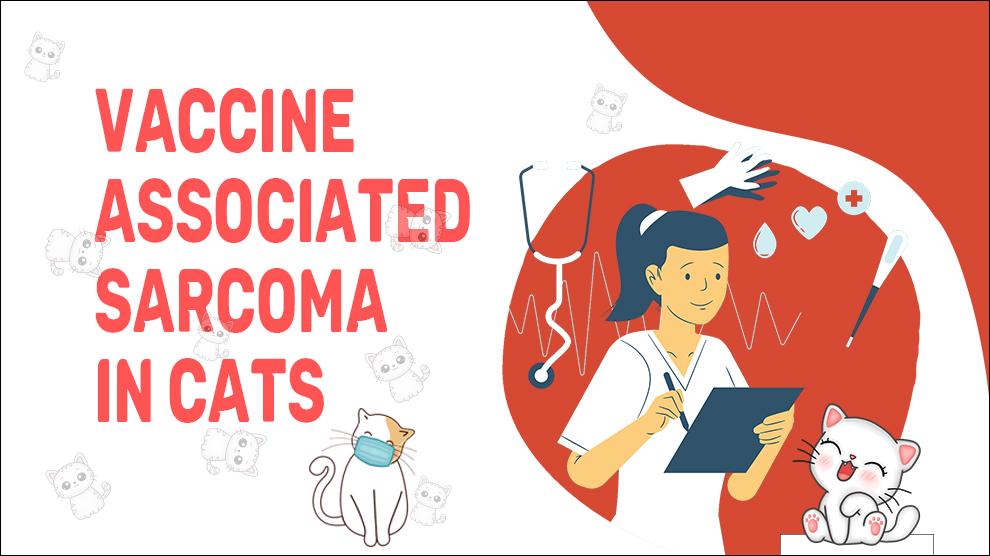What Is Vaccine Associated Sarcoma In Cats?
Vaccine-associated sarcoma (VAS) is a rare but serious form of cancer that can develop in cats after receiving vaccinations.
The condition is characterized by the development of a mass or tumor at the site of a previous vaccine injection, usually within months or years after vaccination.
While the risk of developing VAS is low, it is important for cat owners to be aware of the condition and take steps to reduce the risk of their cats developing this type of cancer.
Clinical Signs Of Vaccine Associated Sarcoma In Cats
Symptoms of vaccine-associated sarcoma in cats can include the development of a mass or lump at the site of previous vaccine injection.
These masses are typically slow-growing and can take months or years to develop. The mass may feel hard or fixed to the surrounding tissue and may be accompanied by other signs of inflammation, such as redness or swelling.
- Skin Ulcer At The Site Of Vaccination
- Skin Lesions At The Site Of Vaccination
Treatment Options For Vaccine Associated Sarcoma In Cats
Treatment for vaccine-associated sarcoma in cats can include surgical removal of the tumor, radiation therapy, and chemotherapy.
The most effective treatment for VAS is often surgical removal of the tumor, which can be challenging due to the location of the tumor and the risk of recurrence.
In some cases, radiation therapy and chemotherapy may be used in combination with surgery to improve the prognosis and reduce the risk of recurrence.
Home Remedies For Vaccine Associated Sarcoma In Cats
There are no effective home remedies for vaccine-associated sarcomas in cats. If a lump or swelling appears at the site of vaccination, it is important to take the cat to the vet immediately for evaluation.
How To Prevent Vaccine Associated Sarcoma In Cats?
Preventing vaccine-associated sarcoma in cats can be challenging, but there are steps that can be taken to reduce the risk.
One approach is to use non-adjuvanted vaccines, which do not contain substances that stimulate the immune system and are less likely to cause an abnormal immune response.
Additionally, vaccination protocols that limit the use of vaccines and spacing them out can help reduce the risk of VAS.
It is also important to monitor cats for the development of lumps or masses at vaccine injection sites and to report any concerning symptoms to a veterinarian promptly.
Affected Cat Breeds Of Vaccine Associated Sarcoma
Vaccine-associated sarcoma can develop in any breed of cat, but certain breeds may be at higher risk.
According to some studies, breeds such as Siamese, Himalayan, and domestic shorthair cats may be more likely to develop VAS than other breeds.
There is no specific breed of cat that is more susceptible to vaccine-associated sarcomas. However, some studies have shown that purebred cats may have a slightly higher risk than mixed-breed cats.
This could be because purebred cats are more likely to receive vaccines due to breeding and show requirements.
Causes For Vaccine Associated Sarcoma In Cats
Causes:
The exact cause of vaccine-associated sarcoma in cats is not well understood, but it is believed to be related to an abnormal immune response to certain vaccine components.
The condition is most commonly associated with the use of adjuvanted vaccines, which contain substances that stimulate the immune system and enhance the body's response to the vaccine.
In some cats, this immune response can lead to the development of a tumor at the site of the injection.
When To See A Vet For Vaccine Associated Sarcoma In Cats?
If a cat develops a lump or mass at the site of previous vaccine injection, it is important to see a veterinarian as soon as possible.
The veterinarian may recommend further diagnostic tests, such as a biopsy or imaging studies, to determine the nature of the mass and whether it is cancerous.
Early detection and treatment of vaccine-associated sarcoma can improve the prognosis and increase the likelihood of successful treatment.
Food Suggestions For Vaccine Associated Sarcoma In Cats
There are no specific food recommendations for cats with vaccine-associated sarcomas. However, it is important to maintain a healthy diet to support the cat's overall health.
Conclusion
Vaccine-associated sarcomas are a rare but serious side effect of vaccinations in cats.
While the risk is low, it is important for cat owners to be aware of the signs and symptoms and take action immediately if a lump or swelling appears at the site of vaccination.
Early detection and treatment can improve the prognosis for affected cats. Vaccinations are still an essential part of cat health care and should not be avoided due to the risk of vaccine-associated sarcomas.
Veterinarians are equipped to manage these cases and can provide guidance on the best vaccination schedule for your cat.











